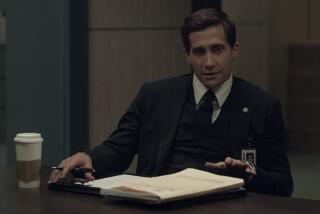MOVIE REVIEW : PLAUSIBILITY BECOMES ‘SUSPECT’ IN DRAMA
If plausibility isn’t at the very top of your list of requirements in a courtroom thriller, and if dashingly assured performances are, you can have a cheerfully good time at “Suspect” (at selected theaters Friday).
Within the first five minutes, director Peter Yates, working from Eric Roth’s original screenplay, cracks across a scene of wild action as a desperate young indigent (Liam Neeson), his body a mass of scabs, his hair and beard wild and matted, fights off arresting officers. He is the prime suspect in the killing of a young Justice Department secretary, based on the evidence of her wallet and his knife, which are found where he sleeps.
Enter Cher, a weary but dutiful public defender assigned to Neeson’s case. Although Neeson has the strength of 10 mountain men and is lethally dangerous, she’s let into his cell quite alone. It’s only after the rampage that follows that she learns part of his problem: a Vietnam vet, he has become deaf and then traumatically mute.
So the stage is melodramatically set for one of the film’s most reliable and satisfying situations, the seesawing courtroom battle, complete with a letter-of-the-law judge (John Mahoney, as good as he was in “Tin Men”); an unctuous prosecutor (Joe Mantegna), and ingenious twists and turns, including electronically transmitted testimony.
“Suspect’s” first departure from the conventional puts Dennis Quaid, a nattily dressed, slickly assured dairy-industry lobbyist, on Cher’s jury--by her own cool choice, but certainly not by his. However, because he is by nature inquisitive and a born manipulator, he cannot resist pointing out to her, surreptitiously, bits of evidence she has muffed.
This is where “Suspect” becomes a matter of conscience for us all. Without a little something developing between these two, we’d have no movie. However, the moment an attorney and a jury member discuss anything, the case can be called a mistrial and the lawyer can be disbarred. But, blithely, Quaid begins playing private detective, and he and the gorgeous public defender--two of the more highly visible people in Washington--have more meetings than a lonely hearts club.
This rather major glitch aside, Yates builds his story so tautly; the great Billy Williams photographs Washington--high and low--so seductively and the whole film is chockablock with such interesting actors that it becomes the easiest thing to put a lid on your skepticism, to sit back and enjoy the ride.
All these actors are admirable, beginning with the Irish-born Neeson (who came to such a brutal end on the river as one of Jeremy Irons’ priests in “The Mission”). Working entirely without dialogue, Neeson’s tragic, homeless vet becomes a fully fleshed-out and powerful character.
Then there is John Mahoney’s Judge Helms, a carefully reined-in performance whose restraint we appreciate completely only at the movie’s end. And there is the thoughtful, intelligent handsomeness of E. Katherine Kerr as the congresswoman whose vote is so crucial to Quaid. Kerr brings warmth to a moment that might be coolly cynical.
And, at the film’s core, there is a tough, illuminating performance by Cher as this complex lawyer who theoretically lives by a strong set of ideals, and another one of those ebullient, Smiling Jack charmers for Dennis Quaid to play. By now it’s a part that fits him so easily--and, on the heels of “The Big Easy” and “Innerspace,” so often--that he might consider roles with more risk to them in the future. Living up to elegant tailoring isn’t quite challenge enough for an actor who seems so effortless.
As it speeds toward its finale, there are plot holes the size of Manhattan potholes, although it is refreshing to have so menacing a thriller with such a relatively low level of violence. And there isn’t a car chase from start to finish--amazing restraint from the director of “Bullitt,” and a positive point of pride these days. This is one to enjoy, but not to question too closely.
More to Read
Only good movies
Get the Indie Focus newsletter, Mark Olsen's weekly guide to the world of cinema.
You may occasionally receive promotional content from the Los Angeles Times.










